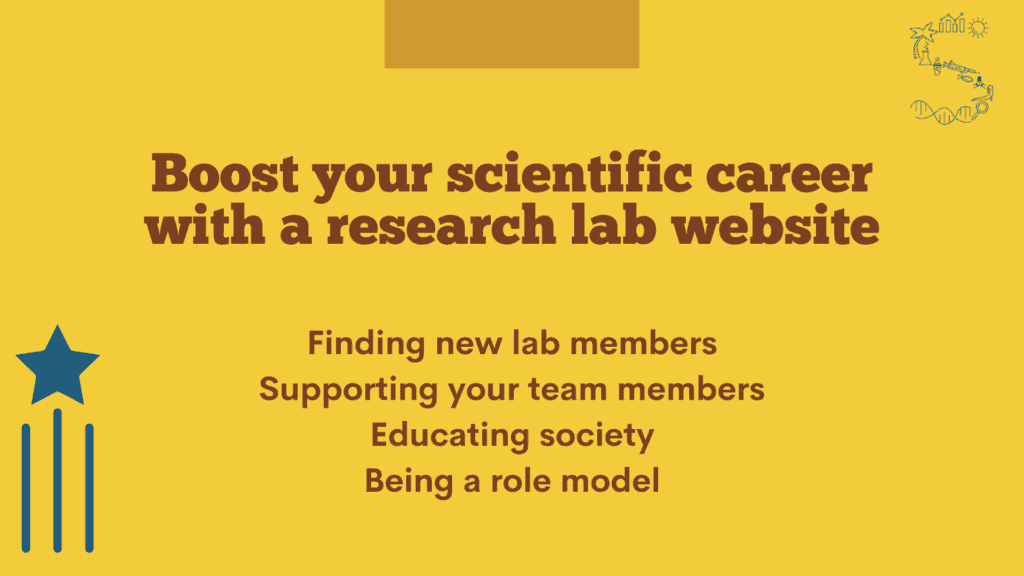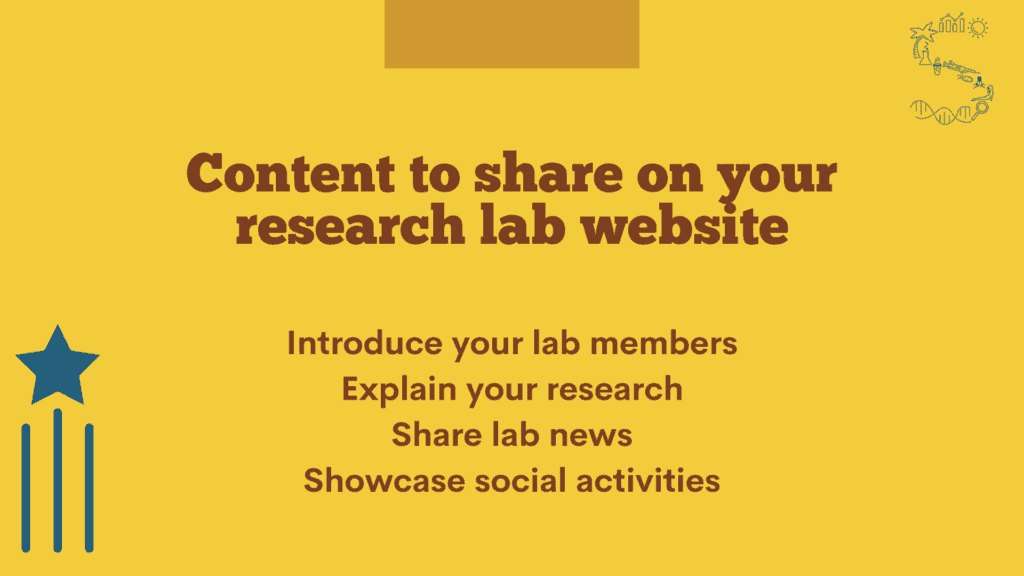We are living in a digital age. So, a lot of scientific outreach activities take place online. As a scientific researcher, you might already run a social media account to connect with other scientists from your field and shout about your research.
However, social media platforms always belong to someone, to a company and they decide what to allow on their platforms. They use complex algorithms to decide to show your content to other users and sometimes your stuff might end up not being seen by anyone.
So, now might be the right time to take over the responsibility and start your own platform to showcase your research, your team and everything else you want to share. To do that, you might want to consider having a website for your research lab. On your own lab website, you decide what to publish, how deeply you want to explain your research (not being restricted by character limits!) and what your online presence should look like.
The advantages of having a research lab website
Sharing your research on a lab website is a great science outreach project since we know that science communication helps advance the scientific field. Additionally, you can use your lab website to introduce your team and show what it’s like to work in your lab. Let’s look at some amazing things you can achieve with your research lab website.
Finding new lab members
Many scientists who apply for PhD or postdoc positions turn to the internet to learn about research scientists and the labs or groups they work in. These young scientists want to gain as much information as possible about their potential future bosses.
Hence, by running a research lab website, you can show potential undergraduate and postgraduate students and postdocs the excellent research that you’re doing. This means that you should explain your projects in a language understandable to someone from outside of your field. You want them to get curious about your research but not let them feel as if your project is too much for them.
Also, make sure you highlight the fun activities that you and your lab members do. This shows future applicants what it would be like to work for and with you.
Giving your lab members a career boost
By showcasing your lab members on your website, you can actively help their careers. Other researchers or group leaders will be able to see your lab members’ expertise and publication backgrounds and might see them as a good fit for their own teams. And we all know how important networking is in academia.
You can also share science outreach activities that your lab members are involved in on your website. This will additionally boost their CVs and employability.
Helping society
Imagine someone outside your scientific field has a question relevant to your research. And they type that question into a search engine. What if your website popped up for them as the answer to their question? Would that not make you feel more accomplished?
This is what these search algorithms are about anyway: answering the questions of their users with content from the internet. So, you could play an important role in helping people find the answers to their burning questions! In this case, however, you need to make sure to explain your research in non-scientific terms and with less jargon!
Being a role model
You might have been a researcher for a while now. This means that other, younger researchers or early-career scientists might look up to you and see you as a mentor. Why not share your experience of being an academic and researcher and what you learned over the years? This will help the next generation of scientists and put you in a great advisory position.
For example, you could share the tools or software that your lab uses or the philosophies that you apply to run your lab. Maybe you have an overarching mission in your research question. Sharing these could attract new collaborators or trigger similar ideas or research lines in other researchers. Don’t forget: Sharing is caring!

What should you share on your research lab website?
Now, having some reasons WHY to start a research lab website, let’s start thinking about WHAT to actually publish on it. When well presented, different pieces of content can achieve the above-mentioned goals. Here are some ideas of things you can talk about on your research lab website.
Introducing your lab members
Showcase each team member with their full name, expertise and contact details. Maybe they can write the descriptions themselves and add personal notes and pictures. Yes, scientists are real people with faces. So, go ahead and show that researchers/scientists are more than just pipette-swinging robots.
Your research explained for both expert- and non-expert audiences
Your website should be aimed at both scientists and non-scientists. So, make sure you explain your research mission to both audiences, so they can learn from it.
When explaining your research in text form, don’t forget to make it accessible for online reading and use a compelling and active voice.
Add illustrations! An image says more than any text-based explanation. Use software like Biorender to produce schematics or models of your research. You could also hire a science artist to produce an explanatory and colourful illustration for you. It is important to break up your text with some visuals and bring colour into your research lab website!
Don’t forget to add your funders at this place as well, as they make all your research endeavours possible!
News from the lab
Yes, as a researcher each grant or publication acceptance is a reason to celebrate and you should tell your audience about them as well! Most research is funded by money coming from taxes, so taxpayers do have a right to know how their money is spent.
It is also great to highlight the achievements of your lab members. Maybe one of your PhD students received an award that boosts their career. Make sure to add a post about such an achievement highlighting how proud you are as a supervisor. This is also a massive motivation kick for all the other team members (I can say from experience!).
While you can also add some stories or pictures from the lab itself, it’s also nice to see social events happening. This is a great motivation for potential new lab members to see that you also care about the social side of your team.

Boost your scientific career with a research lab website
You are probably highly aware of how important it is to share your scientific findings and talk about your research projects in different environments. Whether you are writing a research paper, talking on social media, writing a grant proposal or talking to your family and friends. Whenever you share science, people can learn from it.
And by communicating your research on your own website, you decide what content you share and how much. You can showcase your awesome work to potential new lab members, stakeholders or people interested in science.
And don’t forget: Many grant agencies want to see scientists who share their work and care about educating the public. So, your research website will be a great add-on to your next grant application.
Have you started your research lab website yet? If not, what keeps you from doing so? Share your experience and link to your website in the comments below!

2 Responses
Great! Any suggestion on how to make a website stand out from the (digital) crowd, and in general increase traffic? It’s about SEO keywords? ‘right’ URL? right text? perhaps links to other websites? or something else?
Hi Corrado, thanks for your feedback. Yes, it comes very much down to SEO, great descriptions on the website and mobile responsiveness. Having some social media posts pointing to your website is also very helpful to help search engines understand your website.